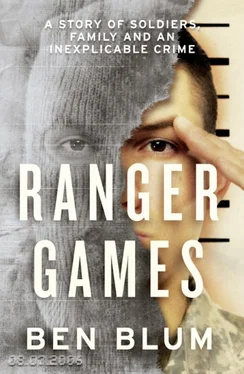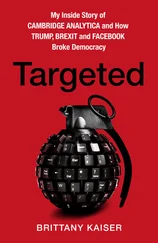It was Saving Private Ryan , the $70 million Steven Spielberg epic released the summer of Alex’s eleventh year, that turned him on to the Army Rangers. Tom Hanks and his squad of Rangers were a unit every bit as cohesive, deadly, and ready to sacrifice for each other as the Littleton Hawks. As terrifying as it was the first time he watched it, Alex came to love the opening sequence of the Normandy landing on D-Day, whose many graphic deaths took on a mythic grandeur in repetition. It was the most realistic depiction of battle he had ever seen, and the message behind it was equally compelling: even in the vast mayhem of war, every single soldier counted, every sacrifice was recorded, every hero was remembered. The army was the biggest team of all. He even recognized the real-life soldier who had inspired Private Ryan: Fritz Niland, a private featured in Band of Brothers whose three birth brothers were killed the week of D-Day.
Alex was old enough now to roam away from the house on his own. On weekends he would meet his best friend, Andrew, at the place where Franklin Street crossed the High Line Canal and scramble down the embankment to the canal bed, where in the cool, echoing darkness under the concrete overpass they pulled on their camouflage and strapped guns over their backs—Alex still had just a BB gun, but Andrew had a real .22-caliber air rifle. For three hours they would make their way along the winding banks of the canal like Green Beret commandos in Vietnam, slipping without a sound between the cottonwoods whose ribbed gray trunks zigzagged overhead, sometimes tromping for miles through the shallow water of the canal.
D-Day was Alex’s, but Vietnam belonged to Andrew, for whom Alex served as the loyal right-hand man who could be counted on for comic relief, a blend of court jester and confidant. In middle school, their duo expanded into a regular group of six. All played competitive sports. All wore mostly cargo shorts, Nike and Adidas T-shirts, and white baseball caps. They got into paintball. On weekend afternoons they would bike together down to Horseman’s Park, an overgrown patch of weeds and pines along the High Line Canal where oddly shaped, never-used horse jumps rose from the hollows, and stage daylong battles, dividing up into teams of three and fighting for control of the ridge along the park’s eastern border. Alex, with his goofball charisma and encyclopedic knowledge of military history, was the group’s tactician, motivator, and comedian. It was paradise for a while, until the old woman who lived in the house atop the ridge saw them out there flanking each other along the canal bed and called the police to inform them that gang warfare had finally arrived in Greenwood Village. A few minutes later, when a bullhorn commanded that they drop their weapons, the boys climbed out of deep cover with their hands raised. The patrolmen rolled their eyes when they found out what the boys were actually packing, but that was the end of paintball in Horseman’s Park.
Death in paintball was just a stinging annoyance that meant you were out until the next round. But at night as Alex lay in bed he played a mix CD he had made for himself of climactic orchestral numbers from his favorite war movies and imagined all the ways it might happen: his convoy flanked and ambushed, or a sniper leading him from a high window, or a Messerschmitt churning up the open field too quickly for him to evade. A circle of shadowy platoon-mates gathered around his body as the music swelled, as in the death scene in the Xbox game Medal of Honor . He liked imagining that his death had saved them all and guaranteed the success of the mission. It helped him fall asleep.
Alex, Andrew, and the rest of their crew started ninth grade together at Littleton High School in late August 2001, dispersing to new coaches for their various sports. Three weeks later, on a sunny Tuesday morning, classes were interrupted by a scratchy announcement on the intercom.
To high school kids in suburban Colorado, the terrorist attacks of September 11 looked like nothing so much as a big-budget disaster movie: slow-motion explosions, mushrooming balls of smoke, insect-sized extras nose-diving from the windows. The mood in the hallways changed instantly. For two weeks the Denver sky was full of nothing but clouds and mountains. Then the planes returned, little metal splinters that dragged a new menace. Weekend paintball sessions suddenly started feeling a lot less like a game. When Alex’s guidance counselor, Angela Zerr, informed him at the beginning of fall semester sophomore year that he needed to attend an after-school career counseling workshop, Alex replied politely that this would not be necessary because he already knew what he was going to do with his life.
Zerr estimates that over the remainder of Alex’s high school career she tried to talk him out of enlisting between thirty and forty times. She had all the Blum children as they passed through LHS, but Alex was a special favorite of hers. Teachers had been telling her for years that they couldn’t believe the clownish, popular Alex was related to Max, who was famous around school for his brilliance, prickliness, and straight A’s, but in Zerr’s opinion Alex was as intelligent as his older brother—he just had different priorities. She begged him to get a college degree first so he could at least enter the army as an officer. Alex told her he wasn’t interested. He wanted to be a Ranger.

I had always felt so different from my family that it was strange at that first lunch with Norm to hear him talk about me and my siblings and cousins as a collective.
“You know, you guys were all at really formative ages when 9/11 happened,” he said, picking at scraps of lettuce with his fork. “It left an impression on people in different ways. For Alex, I think that’s when the wheels really started to turn. In my mind, this was a phase. I kept saying, ‘Alex, that’s great, but you should go to college first, do this after.’ I was trying to coach instead of preach, ’cause obviously preaching doesn’t work too good.”
What finally made it click for Norm was that Alex began studying the infantry handbook in the library between classes and doing ten-mile runs each morning wearing boots and a backpack full of free weights to get in shape for basic training. Once he even cut a mole off his back, figuring he’d have to go through worse for SERE torture-resistance training, and bled so badly he ruined a T-shirt.
“It was his senior year when I finally realized that this was real—he didn’t care about school because he was going to the army. This academic stuff was all meaningless, this stuff wasn’t important. ‘I want to do something important with my life,’ that’s what he kept saying.”
Norm did not exactly share Alex’s sense of military duty, but it was hard not to admire it, rooted as it was in the father whom Norm had equally resented and revered.
Albert Likes Blum Senior was not a likely war hero. He grew up in Gloversville, New York, his name a joint branding effort of the Norman Blum & Co. glove manufacturer and the Likes, Berwanger & Co. department store of Baltimore, Maryland (their famous catchphrase: “Everybody Likes Berwanger!”), and volunteered for the infantry in World War II in part to escape his Jewish upbringing. When he came back he had the bloody papers of a teenage Nazi whose head he’d seen caved in by a grenade in the Harz Mountains, a jagged bolt of shrapnel in his thigh, and a fist of untellable stories in his head. Beverly Beck, whose Methodist family had emigrated from Germany in the 1870s, was the most gentile woman he could find.
Norm, Dad, and their siblings never thought of themselves as Jews. The family celebrated Christmas for the sake of form but worshipped no god but success. Beverly managed to talk Al Senior out of the names he had decided on for his boys during the war—King, Prince, and Duke—but Al still raised them to be winners in the striving American mold, shorn of their tribal history of repression and neurosis. Second place was as good as losing. Whining was as good as quitting. Disputes were settled in the basement boxing ring, battles that repeated themselves on ice rinks, baseball diamonds, football fields, and lakes around upstate New York.
Читать дальше













